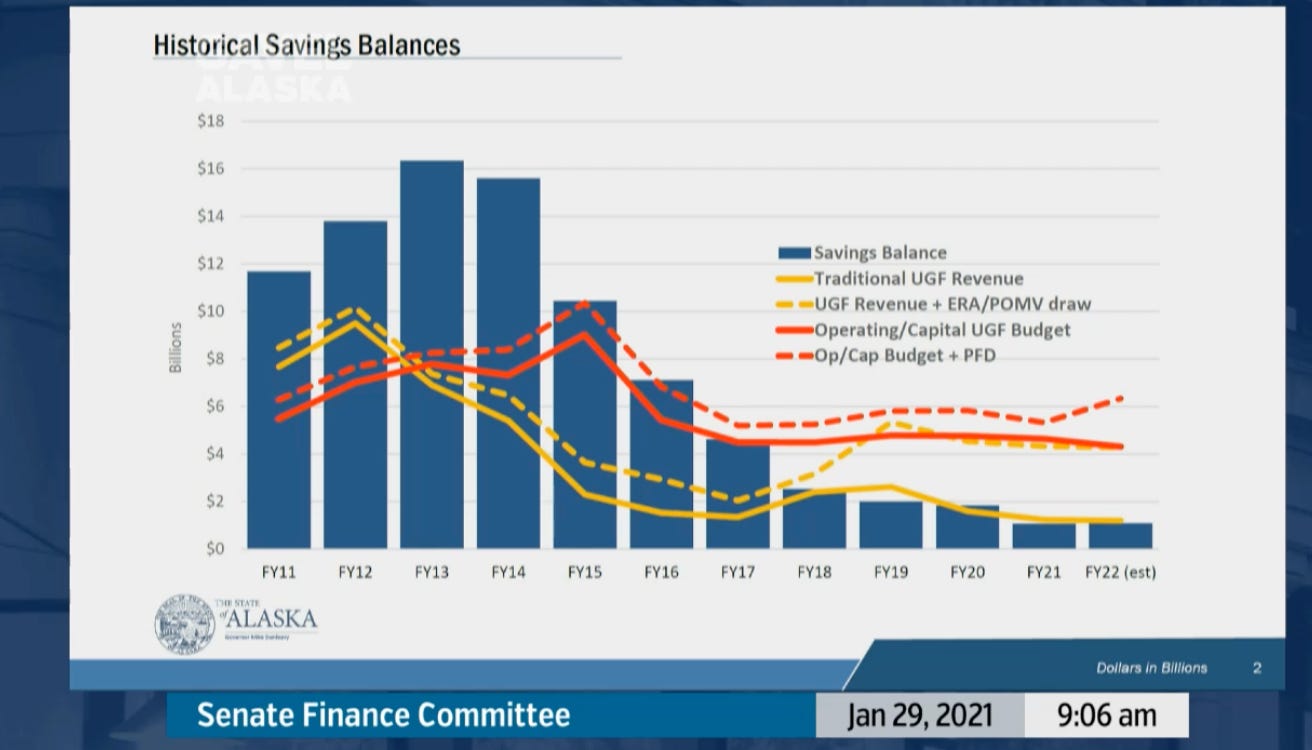The Last Park Ranger
Dunleavy delivers an uninspired State of the State focused more on cancel culture than his lack of a plan to address the state's precarious financial position. The Senate steps up.
Good afternoon, Alaska! It’s been quite the week with several—several!—legislative hearings, the whole Nazi-license-plate saga, the governor’s state of the state address and the House is still not organized! In this edition, I’ll be breaking down what wasn’t said in the State of the State address and what was said during this morning’s Senate Finance Committee. Also, Friday in the Sun is already out with a few more tidbits on organization, Sen. Shower’s voter suppression bill, the Anchorage election and more.
Also a programming note: Next Tuesday’s edition will be the first to be exclusive to paid subscribers. Tuesday through Thursday editions will be paid while Monday and Fridays will continue to be free.
The State of the State
Gov. Mike Dunleavy gave another generally awkward, light-on-details, heavy-on-weird-lines address to the state on Thursday night, the third of his term. He renewed his push for the state-sanctioned gambling and a slate of feel-good constitutional amendments—a strict spending cap, guaranteeing a PFD and one that would effectively bar taxes—that would cripple the state for generations while skirting the details of the state’s incredibly precarious financial situation.
It wasn’t until this morning, while the Senate Finance Committee was going over the governor’s proposed budget with OMB Director Neil Steininger, that it struck me just how little the governor actually talked about the budget during his presentation. We got just three uses of the word “budget” in service of promoting his proposed $5,000 PFD, his severe constitutional spending cap proposal and a $7 million budget request for “ramping up the prosecution of those who commit crimes of sexual assault and domestic violence.” No mention of his budget’s proposed $2 billion deficit, no mention of budget cuts, no mention of overdrawing the Alaska Permanent Fund to pay for dividends and no mention of taxes other than to promote his other constitutional amendment that would effectively make it impossible for the Legislature or voters via initiative to implement any new taxes.
According to Dunleavy, the budget is hardly a concern—especially when compared to the amount of time he gave to environmentalists and cancel culture—so insignificant that all our woes can be fixed by his sole proposal for new revenue: A reheated pitch for legalized gambling that the Legislature largely ignored last year.
“We must also look for creative ways to augment our revenue. … Alaska can no longer afford to deny itself a revenue stream available to nearly every other state in the nation,” he said, in a section that accounted for three of his four references to revenue in the speech (the other being about responsible resource production). “Along with enhancing revenue, gaming could create hundreds of high-paying jobs in some of our communities, and we would join a long list of states that have embraced gaming for some time.”
No wonder why many of his followers continue to push for a massive PFD with only cuts to government as the solution. Look, Alaska is in a tough spot when it comes to its finances, it has burned through its savings over the last decade, its traditional revenue source of oil has dwindled, and it has already gone through many years of deep, existentially threatening cuts.
The solution is going to be a little bit of everything: Cuts, a reduced dividend and new revenues. It would have been helpful for the legislators trying to navigate these decisions if Dunleavy, at the very least, acknowledged they existed.
A clear-eyed look at the budget
Alaskans would be better off watching the Senate Finance Committee overview from earlier today. There, senators met the issues with much more candor than the governor could muster. Here’s a rundown:
The state has burned through its savings, effectively allowing everyone to “put off the more difficult decisions,” Steininger explained, “until now.” It didn’t go without comment that without a dividend of any kind, the state’s budget would be nearly balanced (the difference between the red and the dotted yellow line in this chart). Instead, the proposal to pay a $5,000 dividend creates a roughly $2 billion deficit (the dotted red line) that would be paid for exclusively from the Alaska Permanent Fund, which would reduce returns in future years. “We don’t necessarily have a fiscal crisis,” said Sen. Natasha von Imhof, “we have a priority crisis.”
The governor’s proposing a big general obligation bond package that would be put to the voters. Exactly what’s in it is unclear but senators aren’t particularly convinced that the financial markets will look at debt on top of a structural deficit is a sound investment. They worry that the rates won’t be friendly and the plan won’t work.
Senate Finance Committee co-chair Sen. Bert Stedman was particularly harsh about what he felt were several oversights in the state’s presentation—separating out the dividend, using loads of one-time funding for recurring costs and other measures—and notes that he believes the state’s deficit is “a little deeper than what’s presented today.”
The state’s Constitutional Budget Reserve, once valued around $13 billion, is now down to about $930 million. That means Alaska’s getting to the point where it could be having cash flow problems that affect day-to-day operations. That really starts to happen around $500 million, but the governor plans on drawing about $39.6 million from the account this year. Sen. Lyman Hoffman warned that given the three-quarter vote requirement to make a withdrawal from that account, it’s probably not worth even trying for this year.
So just what does the governor think they should do when it comes to revenue? “We’re open to discussions,” Steininger said, claiming that resolving the dividend is enough of a direction for this year.
Hoffman didn’t appreciate the dodging and said “It seems as both of those issues are paramount to the state: resolving the dividend and looking at additional revenue sources. I don’t believe that we need to look at just one of those issues. We need to look at both of them this year. We should be able to walk and chew gum at the same time,” he said. “That doesn’t seem like a big ask.” He also made a good point that legislators are going to be particularly wary about inflating the deficit over dividends without a plan to address it. It should all be part of the same picture, he said.
von Imhof was particularly harsh about the state’s separation of the dividend from the overall budget picture, arguing “If your administration is going to propose a full dividend and the corresponding deficits that go with it, own it. Put it in all your slides, defend it. Talk about it. Don’t hide behind the fact that we’re just going to pretend that it doesn’t exist because it’s just this very large bar compared to everything else. OWN IT.”
Sen. Bill Wielechowski, D-Anchorage, chimed in though that he’s frustrated with the framing of the state’s financial picture as a binary choice between dividends and state services. “Every dollar that we don’t get from the oil industry … means that money is coming out of people’s dividends. … We’re standing on the barrel of no dividends going out in the future because we’re afraid to get the fair share of our resource on the North Slope.”
Why it matters: There’s a ton to unpack from this meeting. There’s the committee’s overall dissatisfaction with the administration over what they feel to be an incomplete—and overly rosy—look at the budget. Under former OMB Director Donna Arduin this would have been met with stonewalling, but it seems that Steininger has a better working relationship with the building. Stedman has been regularly insistent that the state’s deficit is bigger than Dunleavy is letting on thanks to a heavy inclusion of one-time money in this round of budgeting so next week’s presentation from the Legislative Finance Division ought to be particularly interesting.
The final two bullets highlighting the positions of von Imhof and Wielechowski are particularly important as they essentially bracket the discussion moving forward: How much of the deficit should be bridge with cuts to the PFD and how much should be filled in with adjustments to oil taxes. Keep in mind that just earlier this week, von Imhof was asking what more the state could do to help the oil industry. While Wielechowski’s statements signal that changes to the PFD or the implementation of a broad-based tax such as a sales tax or an income tax are going to be hard lifts as long as oil taxes remain unchanged.
The last park ranger
“When our history is written, will it be that we forced our children to look beyond Alaska’s shores for the American Dream?” Dunleavy said, in a line that I bet lands very differently for everyone who’s known someone who’s moved Outside as he’s throttled the University of Alaska. “That we stood by until Alaska was nothing more than a handful of holdouts fighting to be the last park ranger.”
Around the web
Not all bar owners have a death wish for their staff and patrons, it turns out. The Birchwood Saloon out in Chugiak has remained closed even as the city starts to lift its health mandates and is, instead, getting to work as a makeshift volunteer call center to help folks navigate the state’s vaccination system (I’m not getting misty-eyed, you are!). From the Anchorage Daily News: This Chugiak bartender is turning an empty saloon into a vaccine call center
Sigh. It’s not going to be long before the next wave of campaign ads start to fill the airwaves with U.S. Sen. Lisa Murkowski up for re-election in 2022. After four years of the moderate keeping Trump at arm’s distance, sometimes stymying his agenda and sometimes looking on with concern, her goose would be cooked in the semi-closed Republican Party. That would be, though, until the passage of Ballot Measure 2’s open primary system. From Alaska Public Media: Murkowski gains immunity from Trump revenge with Alaska’s new voting system
From Outside but relevant to Alaska’s politics, here’s this Northern New York Newspapers editorial calling on far-right instigators U.S. Rep. Elise M. Stefanik to dial it down with the lying and return to civil discourse. “Rather than merely working to rile up their base of supporters, Stefanik and Walczyk should return to civil discourse. There are more effective ways to demonstrate where state policies can be improved. The residents of Northern New York shouldn’t be penalized for their representatives’ behavior.” From NNY360: Editorial — Dial it down: Stefanik and Walczyk hurting NNY with provocative rhetoric
Sure, Alaska has a bunch of shares of Gamestop stock but that doesn’t mean our financial woes are solved. From Alaska Public Media: Alaska Permanent Fund Corp, with millions in GameStop shares, eyes stock surge warily
The most wonderful time of the year
In non-political news, WWE’s Royal Rumble is this weekend. It was a whole six years ago that during a particularly lonely start to the legislative session when I signed up for a WWE Network subscription, picked up a Breeze-Inn burrito and logged onto a voice chat with my brother to watch Roman Reigns win the rumble to a stadium of boos. What started as a way to stay connected with my brothers has turned into a deep appreciation for the silly, frequently stupid, sometimes amazing world of professional wrestling. Luckily, my partner has been game for the ride and we saw both the Anchorage and Fairbanks shows when they came up a few years ago.
If this whole thing is preposterous to you, I’d suggest checking out this excellent video essay from Super Eye Patch Wolf (who mostly does video essays on anime, but we’ll save that for another day) explaining why “Professional Wrestling is Stupid and Beautiful and I Love it.”
Have a nice weekend, y’all.





